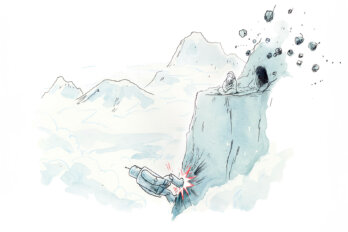On September 15, 2010, a right-wing media star appeared on CBC radio to promote his new book extolling the wonders of Canada’s oil industry. The show was styled as a debate between the author and a skeptical environmentalist. But more important than who won or lost was the fact that a hardcore conservative author had made it into the heart of the CBC’s daily lineup.
The author was Ezra Levant. And the bestselling book under discussion was Ethical Oil: The Case for Canada’s Oil Sands. It went on to pick up the $20,000 National Business Book Award, whose jury was chaired by the dean of the University of Toronto business school and included such talking heads as Peter Mansbridge and Pamela Wallin. The accolade was announced at a downtown Toronto luncheon hosted by two of Bay Street’s bluest chips, PricewaterhouseCoopers LLP and Bank of Montreal. “We are very proud to be involved,” gushed the head of BMO’s human resources unit.
It was Ezra’s high point. If ever he were going to cash out—get a cushy public affairs job, maybe with media stints as the resident conservative—this was the time. Instead, his career became one long series of rants, lawsuits, and festering grievances. Today, as Levant’s radical right-wing website strains at the bolts amid mass defections and allegations of financial impropriety, it’s easy to forget that, for a brief moment at the start of the decade, he was given a taste of mainstream respectability. He rejected it: a decision that serves as the baseline for everything that followed.
Ezra always has been a true believer—not only in the substance of the fringe material he broadcasts, but in his own power to bring Canadians over to his radical views. The fierce backlash he’s suffered following the tragedy in Charlottesville reflects the limits of that belief.
I worked with Levant in the early days of the National Post, where he was a subject of fascination and grief in equal parts. Even in this early incarnation, Levant would say and publish the most outrageous stuff. Yes, there’d be the correction or retraction in the next day’s edition. But it never seemed to stick. Instead, he kept rolling from one high-profile gig to another.
In the spring of 2011—just as Ethical Oil was being fêted—Levant began his run as the primetime star of the freshly minted Sun News Network. SNN flamed out after less than four years—during which time Levant became a sort of Voldemort figure to the Canadian left. But at the point of conception, no one knew how the experiment would turn out. South of the border, Fox News was destroying CNN and MSNBC. In Canada, Stephen Harper had just won his first majority—with Conservative voters complaining loudly about the liberal bias they detected in mainstream news outlets. It wasn’t so crazy to imagine that SNN could transform our media landscape in the way Fox had transformed America’s, with Levant assuming the role of Rush Limbaugh, Bill O’Reilly, and Sean Hannity rolled into one.
This was 2011, still the era of Peak Ezra. With SNN, Levant seemed to sit at the nexus of conservative media, party politics, and big business. Power was shifting west in the country, and Levant was one of the few nationally prominent media figures with a pedigree going back to Preston Manning’s Reform movement. Kory Teneycke, Levant’s boss at SNN, had run communications in Harper’s PMO. And with Ethical Oil getting so much press, Ezra seemed destined to be the toast of Calgary’s C-suites, allowing him to spin his connections and charm into oil-industry ad buys.
None of this happened. And most of the blame lies with Levant, whose acts of on-air self-destruction were epic. He once called the Roma “a culture synonymous with swindlers.” During a monologue about a banana company’s decision to stop using fuel from the oil sands, he told one of the company’s executives, in Spanish, to “go have sex with your mother.”
But his fall from grace also says something about our country and its power structure. The type of public figure whom Levant yearned to become—an outspoken ideologue who also fronts a corporate brand and inserts himself into grownup politics—simply doesn’t exist in Canada. It can’t. Ezra’s arc isn’t just about Ezra. It’s also, in a way, about us.
As Richard Warnica notes in his admirably exhaustive account in Saturday’s National Post, one of SNN’s most obvious problems was that it never had the culture of professionalism required to properly report the news—even when the Harper government dropped scoops gingerly into Levant’s lap. The network failed to develop the symbiosis that exists between, say, Fox News and the Republican Party. Nor did Harper and Levant ever build the kind of personal trust that undergirds this kind of symbiosis. (Think Donald Trump and Hannity, or Brexiteers and the publishers of England’s tabloid press.) Just the opposite: their relationship had curdled back in 2002, when Levant briefly defied Harper’s demand that he back down from his run for a Canadian Alliance nomination in a Calgary-area riding.
But even if the pair had managed to patch things up, it’s not clear that the story would have ended any differently. SNN aspired to be the Canadian version of Fox News. But Sun, like the Rebel, had to operate as an isolated enclave of red-meat conservatism in a country where even the “Conservative” party stands for universal health care, official multiculturalism, and the welfare state. Fox News, on the other hand, exists within a densely populated conservative ecosystem of pundits, fundraisers, scholars, think tanks, activists, lobbyists, and GOP politicians and functionaries—almost all of them reading from the same core catechism on abortion (evil), taxes (bad), Islam (dangerous), gun rights (sacred), and anthropogenic global warming (fictitious). These true believers fight with each other, and subdivide into factions (as is now especially evident in the Trump era). But within those factions, they also create a climate of mutual accountability and support, giving each other news tips, air time, jobs, and retweets.
In Canada, on the other hand, structural barriers make the creation of this kind of conservative ecosystem impossible. Our restrictive campaign-finance laws mean we have no Sheldon Adelson, no Koch Brothers, no PACs. Canadian thinktanks are small and wonky, and tend to studiously avoid the slightest hint of partisanship. Our universities are so monolithically leftist that stray outliers such as Jordan Peterson have become objects of horror. Moreover, our parties don’t hold primaries, which means there are few real dissidents or even meaningful intra-party debates. Power is tightly controlled by control-freak leaders, who set down every jot of official policy, and punish misbehaviour with instant excommunication.
What American political leaders truly crave from their allies is mobilization—which is why there is so much room in that system for Levant-style gadflies, who can get money, votes, or tweets out of their own sub-tribe. Our own Canadian system, on the other hand, rewards predictability, unified messaging, and top-down party discipline—the very opposite of what Levant brings to the table, either as pundit or political operative. I wonder whether anyone at SNN understood this when they set up their network.
Spurned by Harper, Levant soon realized that his only path forward was to flip off the Conservative establishment, go rogue, and aim his SNN show at ordinary viewers—whose most acute appetites went to the issues that mainstream politicians and media outlets wouldn’t touch. His most provocative segments became little boreholes into the brittle crust of political life, venting the accumulated off-gasses of anger and nativism lying beneath.
In one notorious 2014 episode, Levant used his Sun platform to promote the false claim that Muslim students in an Ontario school district were being singled out for permission to opt out of Remembrance Day ceremonies. “It’s a disgrace that any family would object to [such ceremonies]—especially an immigrant family who came here to benefit from our country,” Levant wrote, in denouncing the completely fictional school board behaviour. “And even if some old bigot from a backwoods village in Pakistan or Somalia doesn’t want to respect Canada, that’s where our schools come in and teach those bigots’ kids and grandkids what it means to be Canadian.”
But those words were tame by the standards of what Levant would serve up once he started up the Rebel. At SNN, Levant had some nominal oversight, and the network occasionally would even formally apologize for his most egregious stunts (such as when Levant referred to Pierre Trudeau as a “slut” who “banged anyone”). But at the Rebel, Levant was the boss. (His formal, self-conferred title was “Rebel Commander.”) And so there was no one to keep him in check when his site became a clearing house for cherry-picked horror stories about Muslim life. In January, when police charged a Canadian-born white nationalist with murdering six worshippers at a Quebec City mosque, he promoted the conspiracy theory that the attacker was actually a Muslim congregant, and then shamelessly used the story to solicit donations to the Rebel.
The big numbers on the Rebel’s YouTube site attracted attention-seeking sensationalists such as Faith Goldy and Gavin McInnes, who in turn pushed the numbers even higher. It was a cycle, though not a virtuous one. And in this way did Ezra go down his dark path.
Levant has a habit of turning friends into enemies. And a lot of his public appearances now consist largely of him reading lists of people he doesn’t like. While his attacks are too hyperbolic to be credible, it’s easy to understand the source of his persecution complex.
Again, go back to 2011 and Ethical Oil. Levant was carrying water for some of the most maligned corporations in Canada. The book made the novel argument that oil shouldn’t be seen as a generic commodity—at least, not in moral terms. The proceeds from our oil sands go (mostly) to Canadians, while the proceeds from Saudi oil fields are reaped by a dictatorship that bankrolls a militant and socially retrograde brand of Islam, oppresses women, and has supported terrorists.
Never mind the flaws in the argument. Just by making it, Levant helped shift the focus of the oil-sands discussion from black goo and dead ducks to the glories of our socially progressive Western democracy. And he did it a crucial time, following a series of ugly PR disasters involving dead animals and a steady stream of attacks by celebrated environmentalists.
In the United States, where Republicans, oil companies, and industry-funded think tanks have actively collaborated for decades to spread propaganda (and sometimes outright misinformation) about the harms caused by fossil fuels, Levant would have been able to write his own ticket. But here in Canada, it’s notable that Ethical Oil got a muted reception in corporate circles. The amateurish “EthicalOil.org” website created by a former Conservative staffer got little traction, and doesn’t seem to have been updated since 2014. To my knowledge, no one at Syncrude or Suncor objected publicly when Greenpeace went after Levant’s “Ethical Oil Institute” as a possible front for government-coordinated oil-sands agitprop. A list of the institute’s principles suggested no corporate involvement.
One reason for this is that in mid 2010, around the same time Levant was publishing Ethical Oil, the Canadian Association of Petroleum Producers unveiled a new, warm and fuzzy public relations strategy that was light on scientific specifics and big on wilderness photography. Levant’s fiery claims about Islamic oil producers were completely off message. So was Levant’s ongoing global warming denial in his media appearances. The CAPP website doesn’t mince words on this subject, stating flat out: “Greenhouse gases from human activities are a significant contributor to climate change.”
Much of Levant’s career has been spent as an apologist for some of the planet’s most controversial corporate actors, such as tobacco companies. And he’s good at it. But by the time SNN started in 2011, and certainly by the time the Rebel began operation in 2015, his aggressive debating-society messaging fell out of step with modern marketing practices—which is all about enlisting activists as allies, rather than challenging them. Despite all the plaudits Levant received for Ethical Oil, he already was yesterday’s man within the very industry to which he’d addressed his book-length love letter.
That’s why Levant’s attacks often seem so bitter. In his telling, Canadian politics is a centrist oligopoly run by vote-grubbing whips whose only goal is to perpetuate their hold on power, while corporate shills pay cynical homage to the false claims of leftist advocacy groups; all while ordinary Canadian patriots are stigmatized as idiots and racists for speaking their mind about the cultural forces threatening long-cherished values.
That’s not how I see the alt-right’s kampf in this country. But if it were, I’d be bitter and agitated, too. Just like Ezra.
Despite all the high-fiving being done by the media party on Twitter, Ezra’s not finished. Even if the Rebel goes dark, he’ll plot his next resurrection. His most valuable capital asset always has been the donor mailing list that he’s curated since the 1990s—a catalog of core Canadian conservatives who can be counted on to ante up for new campaigns. Their climate-change denial and stealth-sharia fantasies aren’t going anywhere. And Levant always finds a way to monetize their furies. It’s what he does.
But having become disillusioned with the elites who once air-kissed him at Toronto luncheons, he may try plying his trade outside our borders. If I had to predict Levant’s next move, it would be that he’ll join an American counter-jihadist outfit such as the Gatestone Institute, or Pamela Geller’s Freedom Defense Initiative, which would allow him to say and write exactly what he’s saying and writing now—but with access to levels of financial support and political cover that Canada can’t supply.
And when that happens, I wonder if the next nemesis to have earned a spot on that ever growing enemies list he keeps at the tip of his tongue will be Canada itself.






